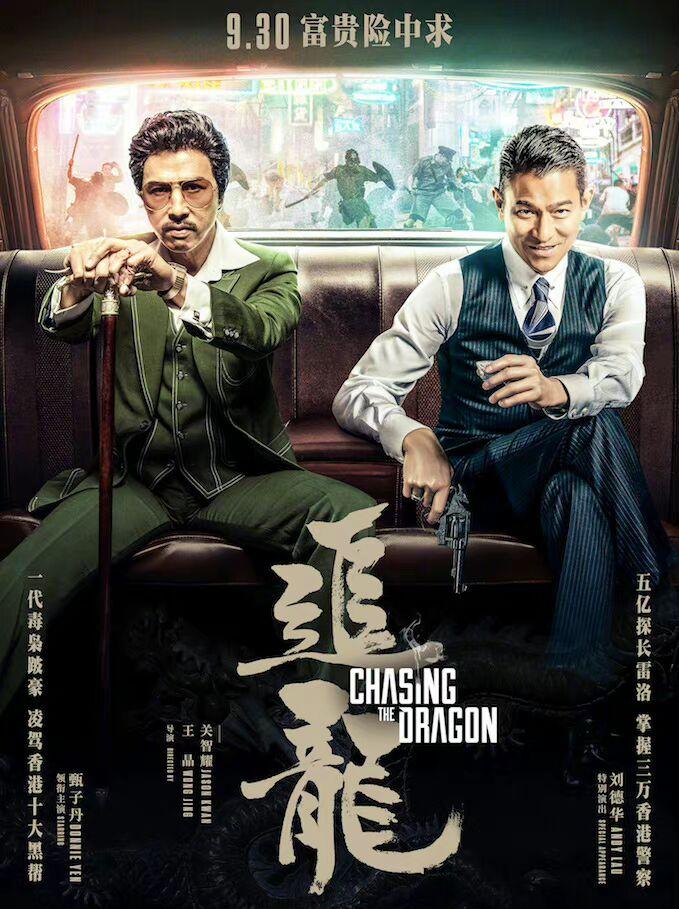
In the 1990s, there was a popularity in the Hong Kong film industry. The "gangsters" refer to the drug dealers of the 1960s and 1970s, as well as the high-ranking police officers who shielded them, the so-called "Four Detective Chiefs". This film trend began with "Lame Hao", after more than twenty years, Wang Jing's team once again returned to the old theme of the golden age of Hong Kong films, reinterpreting the story of Lame Hao and "Half a Billion Inspector" Leiluo into "Chasing the Dragon", this time no longer with a single "Tyrant" as the protagonist, but with that era as the protagonist.
The movie "Chasing the Dragon" starts from the perspective of the illegal immigrant Ahao. In the 1960s, he smuggled himself from the mainland to Hong Kong, which was a corrupt and greedy society of collusion and collusion. While participating in a gang fight, Ah Hao encounters Inspector Leiluo. Relo appreciates Ahao's skills and courage and helps him escape from the hands of British police officers. This favor, as well as the friendship of Chaozhou compatriots, the two became friends.
During a gang ambush, Ahao injured his right leg in order to save Relo, and has since been known as "Lame Hao". With Leiluo becoming inspector General and establishing the Black Gold Empire, Cripple Hao also became the first person in the drug world with his support. The two dominated the black and white, the power fell to Hong Kong, except for the British police can not touch, they are not afraid, until 1974, the establishment of the Independent Commission Against Corruption ...
a fictional society
One of the selling points of "Chasing the Dragon" is that Andy Lau is used to play the Leiluo he played in his youth, and the story is not told by entering the police academy like the early "Five Hundred Million Detective Chief", and he is already the newly appointed Inspector Hua as soon as he appears. The role of lame Hao is played by Zhen Zidan, because the protagonist is played by an action actor, and the appearance of the action scene is logical, and the reason why Lame Hao is favored by Leiluo is also because of "fighting" first. Therefore, the lame hao, who was originally the boss, spent more time playing the role of a thug in this movie.
I don't know if it's because Yindu made "Poison" earlier. There is a ready-made Kowloon Walled City set, so many of the film's highlights have also been moved to the walled city, including the most critical fight. As for whether Zhen Zidan showed the style of a martial arts superstar in the play, this point of "Chasing the Dragon" is quite realistic, and the characters are all "rotten boys" of typical underworld armed fighting.
Wang Jing's new interpretation of the legend of the lame Howello is more emphasis on dramatic conflict, emptying the social context of the 60s and 70s, and in order to strengthen the effect, the ultimate villain is placed on the foreign police officer (but the ICAC that ended the corruption and chaos is also led by the British). Lame Hao's ultimate ideal in "Chasing the Dragon" seems to be to kill a foreigner to get over the addiction, rather than to unify the Hong Kong drug market. That kind of hysterical sensationalism is close to the French gangster film of "Dragon and Tiger Fight". In the film, the various twisting and fighting methods of Lame Hao and Leiluo are very Wang Jing's entertainment tastes.
Negative metaphor
Speaking of which, the last time Hong Kong gangsters became popular, it was at a very interesting point in time. In the early 1990s, the status of the Independent Commission Against Corruption was established and the Hong Kong Police Force had established a positive image of professionalism and integrity. In the past, the era of rampant corruption and black and white was a distant legend, which became a kind of nostalgic symbol, and the parole of the person involved became social news, which further satisfied the curiosity of the young audience at that time.
The old version of "Lame Hao" also used a practice similar to Japan's "live-record gangster films", using a lot of black and white hard photos to create an atmosphere of the times. Lame Hao is one of the earliest Hong Kong films that emphasized that the character was a Chaoshan person, and the dialogue in Teochew was heavily used in the film, especially when swearing. The gangsters of other backgrounds are also represented by different rural sounds (such as Hakka dialect), which matches the realism emphasized by the movie. Chasing the Dragon also adopts this dialect strategy, where Teochew is both the everyday language of lame and brotherly, as well as a tool for Communication when Leiluo emphasizes the relationship between Chaoshan and his fellow villagers.
In the film, the "success" of Lame Hao and Leiluo is like the opposite of some kind of "Hong Kong experience", and the positive experience is that of Hong Kong businessmen who also started in that era and also came from Chaoshan Province. Leiluo stressed in "Chasing the Dragon" that the underworld fights with each other and messes up the entire underground economy (the white powder market), and as a result, everyone is delicious, and his ideal is to corporatize this market to manage the clouds, and the mouth is as ambitious as the entrepreneur. Such a metaphor for a criminal being an alternative "successful" person has a long tradition. American gangster movies as early as the 1930s were seen by critics at the time as a negative metaphor for a kind of "American Dream". In this regard, Wang Jing's treatment is still very traditional.